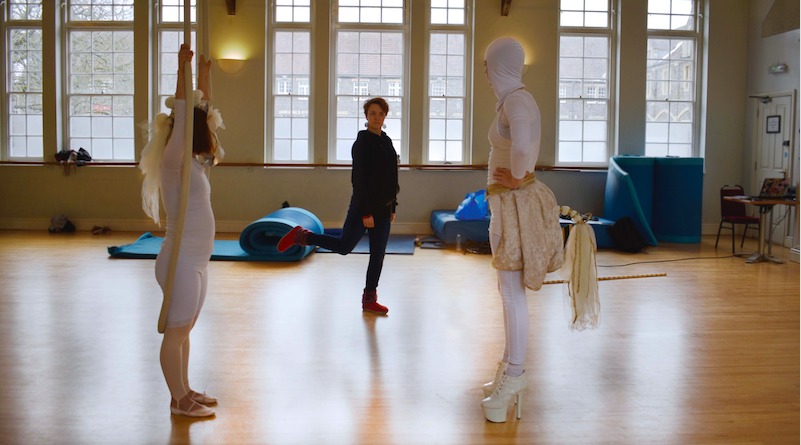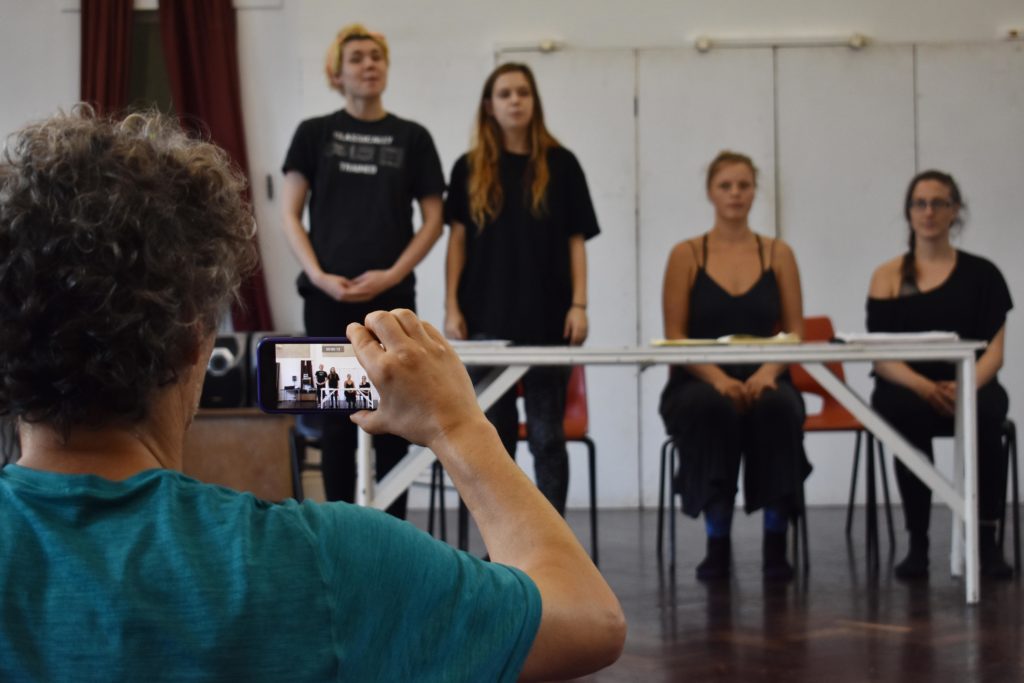Quick Talk with Circomedia’s Dr. Bim Mason About the Circus Directing MA

In this companion article to Stav Meishar‘s Molding the Next Generation of Circus Directors at Circomedia , Circomedia co-founder and current artistic and education director Dr. Bim Mason reflects on the 2nd year of the MA program as it draws to a close. It is one of the first graduate level directing programs to be offered in the professional circus world.
Kim Campbell: What is a standout moment for you from the year of working with this group?
 Dr. Bim Mason: So far, it has been a day when we did a ‘case study’ with emerging artist Hazel Lam. This is something we can offer to artists who have a piece in development. She showed us her piece and then we gave feedback using the DAS Arts feedback method that I was introduced to in a FEDEC workshop in Madrid and that we had used with another ‘case study’. This careful process opened many different areas of possible development as well as giving a clear indication of what worked and what didn’t. Then our MA students had 30 minutes each to work on a particular section or aspect of Hazel’s piece. This was great because they demonstrated all their different perspectives, strategies and areas of expertise to each other in a collaborative process and Hazel received a huge amount of directly useful feedback that she could incorporate in time for her preview.
Dr. Bim Mason: So far, it has been a day when we did a ‘case study’ with emerging artist Hazel Lam. This is something we can offer to artists who have a piece in development. She showed us her piece and then we gave feedback using the DAS Arts feedback method that I was introduced to in a FEDEC workshop in Madrid and that we had used with another ‘case study’. This careful process opened many different areas of possible development as well as giving a clear indication of what worked and what didn’t. Then our MA students had 30 minutes each to work on a particular section or aspect of Hazel’s piece. This was great because they demonstrated all their different perspectives, strategies and areas of expertise to each other in a collaborative process and Hazel received a huge amount of directly useful feedback that she could incorporate in time for her preview.
KC: As you prepare for the third year of the Circomedia MA program, what might you do differently, or add to the curriculum?
BM: We will certainly look to see if there are other artists in the right place to benefit from the ‘case study’ sessions. We will also aim to integrate the MA students more with the undergraduate courses and teaching staff. The other main development will be to give more guidance on academic methods and standards to those who are coming from a more practical vocational background and also provide a more thorough interrogation of the assumptions that MA students come with.
KC: Can you explain a couple of ways that circus dramaturgy and directing differ from theater dramaturgy and directing?
 BM: The main difference from theatre directing is that in circus there is no existing text to be interpreted or, if there is, there needs to be thorough reworking away from naturalism and conventional ways of conveying meaning. Authorship has to be shared with the performer because their intimate knowledge of their capabilities determines what can be expressed. Dramaturgies in circus can be said to be inextricably linked to themes of success and failure but a more significant difference from theatre is the dominance of actuality over illusion. This, of course, affects representation of character but more significantly affects the use of words. Words stand for things, they represent a thing and therefore can open up ideas and concepts that cannot be embodied in a moment of performance. So with circus we are dealing much more with communicating visceral feelings that are hard to articulate. Meaning can only be dealt with indirectly through metaphor and allusion.
BM: The main difference from theatre directing is that in circus there is no existing text to be interpreted or, if there is, there needs to be thorough reworking away from naturalism and conventional ways of conveying meaning. Authorship has to be shared with the performer because their intimate knowledge of their capabilities determines what can be expressed. Dramaturgies in circus can be said to be inextricably linked to themes of success and failure but a more significant difference from theatre is the dominance of actuality over illusion. This, of course, affects representation of character but more significantly affects the use of words. Words stand for things, they represent a thing and therefore can open up ideas and concepts that cannot be embodied in a moment of performance. So with circus we are dealing much more with communicating visceral feelings that are hard to articulate. Meaning can only be dealt with indirectly through metaphor and allusion.
KC: How long did it take to develop this program?
BM: We had the first meeting in September 2013 and had it ready for 2016 but had to delay for a year for various reasons, starting in 2017. As well as designing and accrediting a course, the development has been as much about drawing together very disparate ideas about circus itself as well as different contexts and styles of directing. It reminded me of trying to pull together an amorphous range of practices when I wrote a book about street theatre thirty years ago.
KC: Who is the degree program for? Where do you draw students from?
BM: The degree is ideally suited to those who have both academic backgrounds and experience of working in circus. Many are coming to the end of their performing careers due to age or injury issues and are looking for a way to develop their artistic practice offstage. Some are interested in raising their level of employment in the profession. Others are more focussed on artistic research. Students have come from Finland, Hungary, the USA, Scotland, Wales and locally.
KC: What is a typical day like in the MA course?
BM: There is not a typical day. A typical week in the first part of the year would include a day workshop from a leading UK circus director, a seminar or two on theory and context, a tutor-led practical workshop, a one-to-one tutorial, sessions directing students on the Circomedia undergraduate courses (or equivalent) and self-directed planning, reading and reflective writing. The course is ‘front loaded’ with a lot of input in the first part of the year and long projects and placements supported by tutorials in the second half of the year.
Applications for the MA go directly through Bath Spa University- the closing date for which is the 1st August, 2019. There is also further scholarship information available here.
Related content: Molding the Next Generation of Circus Directors at Circomedia
All photos provided courtesy of Ben Tansey
Editor's Note: At StageLync, an international platform for the performing arts, we celebrate the diversity of our writers' backgrounds. We recognize and support their choice to use either American or British English in their articles, respecting their individual preferences and origins. This policy allows us to embrace a wide range of linguistic expressions, enriching our content and reflecting the global nature of our community.
🎧 Join us on the StageLync Podcast for inspiring stories from the world of performing arts! Tune in to hear from the creative minds who bring magic to life, both onstage and behind the scenes. 🎙️ 👉 Listen now!
